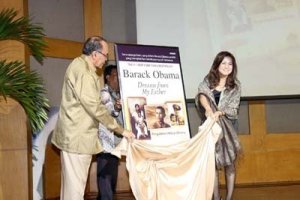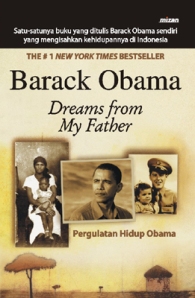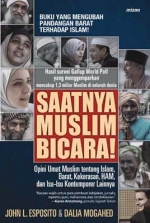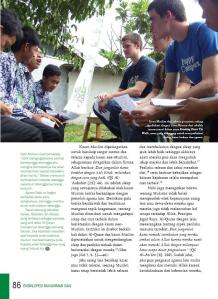What is IA-P2P Dialog?
IA-P2P (Indonesia-America People to People) Dialog is a forum to enhance dialog, understanding, and cooperation between Indonesians and Americans in the cultural field, initiated by a group of top Indonesian intellectuals. Members varied from academicians, businessmen, teachers, social workers, NGO activists, artists, journalists, professionals, translators, editors, movie producers, politicians, diplomats, philosopher, housewives, students, etc.
Why is IA-P2P Established?
In recent years, there were clear indications that relationship between the Muslim world and the West, especially the US, is deteriorating. Decades of misdirected American foreign policy have contributed to the very negative perception of the US among Muslims. The last two terms of American presidency, which saw the 9/11 attacks and responses to them, the invasion of Afghanistan and Iraq, and the never ending violence in Palestine, have worsened the situation. Some studies even show the rise of anti-Americanism. While Americans do not seem to understand why there is such a strong hostility, it is actually also true that many Muslims do not seem to understand America.

Abdillah Toha, founder of the IA-P2P Dialog, launched the Indonesian edition of Obama's memoir: "Dreams from My Father", published by Mizan, on Friday, 26th June 2009. At the same occasion, he launched Indonesia-America People to People (IA-P2P) Dialog.
Obama’s long-awaited speech to the Muslim world, titled “A New Beginning”, indeed may mark a new beginning. While the new beginning offers some rays of hope, it is that: a beginning. He himself recognizes “that change cannot happen overnight. No single speech can eradicate years of mistrust.” So what needs to be done?
The US president certainly will play a very important role in rolling this new beginning into a more meaningful reality. However, to succeed a president need support. His Administration, the Congress, the media, his people may not be as ready for the new beginning as he seems to be. Without their support, a break from the past from decades of mistrust is hardly imaginable. New contested issues will undoubtedly emerge, which may be used as a pretext that the proposed new, more dialogical way of dealing with things will not work, and will force a return to the old ways—not a new beginning.
Indonesia-America People to People proposes to take a small, but we believe significant, step strengthening the new beginning, and building up on it. The emphasis here is on “people to people”. On our part, we will attempt to improve Indonesian-Muslim community’s understanding of the West, especially of America. On the other side, we hope this step will contribute to a better understanding of Islam and Muslims among American people. After all they are the ones who elect politicians and approve their policies. The people, at the end, are the one with the highest stake in this matter.
Why we think it is important to do something about our mutual ignorance? While policies are made by governments and other branches of the state, people can point the way based on their own experiences. Peoples in Indonesia and America, who both live in one of the largest democracies in the world, would ultimately have the power to change the predicaments of their countries. Both people have also shown that such an aspiration for change through democratic means is not only attainable, but is already a reality.

Indonesian version of the memoir of US President Barack Obama, published by Mizan, one of the biggest publishing house in Indonesia, with the hope to enhance mutual understanding between Indonesia and America.
Why should Indonesians care about this? One reason is simply that in this important and unique moment in American history today we see a golden opportunity that opens up the possibility of bridging the gap between two great civilizations. Whatever people in Indonesia or elsewhere think of America, it is undeniably true to say that America is and, for some ti me to come, will still be a power to be reckoned with in the world. Indonesia, being the largest Muslim population in the world with its characteristic moderation and tolerance, would be a good partner in initiating this joint effort toward mutual understanding and respect. America, as any other nations in the world, is not a homogenous entity. A homogenized America is a fictitious entity. A homogenized “Muslim world” is equally fictitious. Only a concrete, meaningful experience between peoples may rectify the existing mistrusts.
Reaching to the Root: Ignorance, Mistrusts and Dialogue
Indonesia-America People to People also responds to recent findings of some global survey, such as of the Pew Research Center* and Gallup Poll**, which shows ignorance in Muslim and Western views of each other. The latter survey emphatically says that the most important thing Westerners can do to improve relations with their societies is to change their negative views toward Muslims and respect Islam. In contrast, Muslims’ view of the West (and, Indonesians are no exception at all) is clearly not free from negative prejudices. The surveys, in other words, found simple reason for the mistrust between Muslims and Westerners: they do not know each other.

The Indonesian version of Esposito's and Mogahed's book, "Who Speaks for Islam? What a Billion Muslims Really Think"; an in-depth research offering insights into what Muslims actually believe about key global issues such as democracy, radicalism, and women's rights, in an account that seeks to differentiate extremists from everyday Muslims.
Despite many justified discontents over American misperception of the Muslim world, Muslims do need to understand the US much better. Some of these discontents have unfortunately led them to view America as a monolithic, negative entity which forecloses the possibility of meaningful exchanges and improvement of perceptions toward a better relationship. It takes both peoples, who are ignorant of each other, to rectify the mistrust.
One sure way to do that is through meaningful and persistent dialogue. That precisely is what we will try to do: initiate dialogue, in its many forms, in order to eliminate the barrier of mutual mistrust so that a more humane world may come forth as a result. While these are indeed big words, we will start with small steps.
For many people, dialogue has lost its currency today. Despite many dialogues that have been attempted so far, misunderstanding and conflicts are still very much alive. But the question is, is there an alternative to dialogue? Rabbi Jonathan Sacks reminds us “the greatest single anti dote to violence is conversation, speaking our fears, listening to the fears of others, and in that sharing of vulnerabilities, discovering a genesis of hope.” (The Dignity of Difference, Continuum, 2002, p. 2). If dialogues so far have not reached their purported goals, that should not mean that we should abandon dialogue. Instead, we need even more dialogues! Probably we have not dialogued enough, or well enough.
Dialogue is not an easy task. Dialogue is not simply sweet talks nor a rosy portrayal of ourselves in relation to others. Dialogue, sooner or later, would force us to acknowledge that not all is well. An effective dialogue should always be accompanied by self-critique. A critique of how we look at the others; as well as a critique of what may be wrong within us. But a good dialogue should not also be afraid to be critical of others. Others’ critique would be a mirror for us, and we for others. In this regard, the next step in dialogue is acceptance of others –whom we may conceive to be mistaken, misdirected– for what they are. It is also important to note that in order for a dialogue to be successful, it must be inclusive, and not conducted only among those who are already converted. Dialogue participants should be wide open and include even those whom we consider to be on the extreme wings. Otherwise, dialogue will only produce output which has already been agreed upon even before it takes place.
“A homogenized America is a fictitious entity.
A homogenized “Muslim world” is equally fictitious.”
The premise of this initiative is that there are more things which could unite us as members of humankind than what divides us as citizens of a country or members of a religious group. As conversations take place, stereotypes corrected, constructive ways for transformation found, understandings achieved, we will be enabled to work together for creating a better world.
Indonesia is uniquely placed at this historical juncture. Indonesia’s large Muslim population and its position which is far from the world hot spot in the Middle East, promises a fresh insight and windows of new approaches to the many divisive issues. Its hard-gained, young democracy assures a free exchange as a means for transformation.
What does IA-P2P do?

An excerpt-page from "Ensiklopedi Muhammad". The caption of the photo reads: "(Indonesian) Muslim students from a pesantren (Islamic boarding school/madrassa) were discussing with (foreign) Christian students from an international school in Indonesia on the occasion of "Breaking Down The Walls", an event designed to bridge inter-cultural and inter-religious dialog." This popular encyclopedia of the Prophet Muhammad is published by Mizan, one of the most important publishing houses in Indonesia, the largest Muslim country.
Indonesia-America P2P will initiate the much needed dialogue in many forms. It may involve conventional dialogue, a kind of summer camps, workshops in specific sector (e.g. youth, mass media, intellectuals, students, religious leaders, educators, activists of religious mass organizations, etc.).
The key here is multiplication of impacts. Dialogue will necessarily involve a very limited number of people. More and more dialogues need to take place. From the limited number of individuals of dialogue participants, we may expect the spread of new understanding to a larger and larger community.
Thus another key is follow-up activities. Dialogues should not be a one-time event. The expected new understandings that emerge need to be maintained, enriched and brought to wider audience. Outcomes should be planned in accordance with the dialogue participants—it may be in the form of youth activities, popular articles, joint publication of academic papers from research workshops, films, or any other art forms, all of which should be produced collaboratively.
In the long term, this P2P initiative would only be meaningful if this is fully supported by the concerned people themselves. At this point we invite participation by as wide range of people as possible, who are interested in supporting this initiative and get the benefits, as well as take the risks, of conversations.[]
Who are the member of IA-P2P?
IA-P2P membership is open to all interested persons.
Following are our board of trustee:
Abdillah Toha
A. Malik Gismar
Anies Baswedan
Asna Husin
Azyumardi Azra
Din Syamsuddin
Haidar Bagir
Imam B. Prasodjo
Komaruddin Hidayat
Mochtar Pabottingi
Putut Widjanarko
Vivi Alatas
Zainal Abidin Bagir
Secretary: Ilham D. Sannang